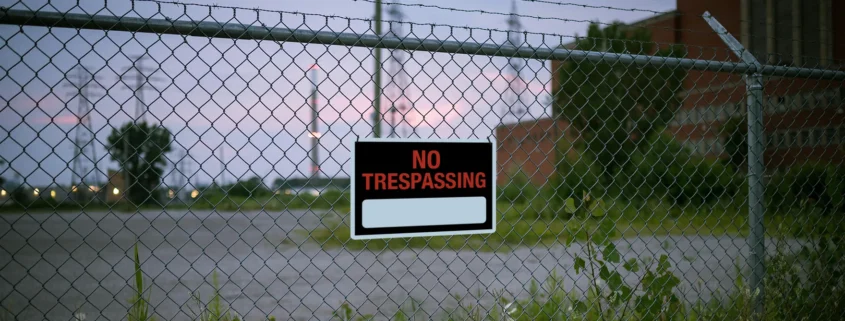
Get off my Lawn! The law of Trespassing on Land in Pennsylvania
In Pennsylvania, trespassing on land can give rise to either civil or criminal penalties. A “civil trespass” refers to an action suing someone for damages to your land, while criminal trespass results in penalties such as jail time or fines.
In many cases the police decline to act on basic trespass and will leave the owner in charge of pursuing their own claim in civil court, so this article will focus on the private cause of action for trespass.
Trespass can be unintentional
Under Pennsylvania law, trespassing does not require intent. This means that someone who trespasses on your land is liable, even if they did not know that it was your land or did not realize that their trespassing would be offensive to you. Trespassing requires a showing that you have either ownership of or a right to possess the land in question and that someone else entered that land without “license” or permission.
What are some examples of trespassing?
Trespassing includes causing something or someone to enter land. A person who causes water to flow onto the land of another can be a trespasser, and someone who throws garbage on someone else’s land also trespasses. Trespassing can also include certain types of pollution.
Other examples of trespassing that have been recognized under Pennsylvania law include installing a fixture, planting trees or even allowing one’s own trees to grow to a point where they branch over the neighbor’s land.
What damages can I pursue against a trespasser?
Trespass damages include the value of your land that was diminished or the cost of clean-up. Damages can also include the loss of enjoyment of property for a period of time, as well as costs reasonably suited to abating any pollution or nuisance.
For this reasons, many trespasses do not get pursued in court. The cost of suit is often not worth the value of the damages. But injunctive relief can be issued in some circumstances, and this may make the trespass more worthwhile.
Continuing Trespass vs. Permanent Trespass
Under Pennsylvania law, there are three types of trespass. First is simple trespass, where someone trespassed a single time on property. But two other types of trespass often come into play: A continuing trespass versus a permanent trespass.
A continuing trespass is when someone continually trespasses on your land. This is sometimes also known as a defiant trespass in criminal contexts. Someone who continues coming on your land over and over again after they have been told to stop is a continuing trespasser. This means that they can be liable for additional damages, even including punitive damages, depending on the circumstances. A continuing trespass also involves a situation where someone has caused some sort of damage that is recurring. For example, if a polluter is polluting everyday, this might be a continuing trespass.
A permanent trespass is different. A permanent trespass is when a single act causes continuing harm. This includes a situation where someone causes damage to something on your land which causes water to spill out and causes destruction for weeks or months. It could also include a situation where someone does something that permanently diminishes the value of the land, even though the full consequences aren’t known for years. A common example is when someone causes a chemical spill or something else to affect the value of your land. While the spill may be ongoing, it was a single act, whether negligent or intentional, which brought about the permanent damage.
Conclusion: Call Cornerstone Law Firm
If you have suffered a trespass or are being accused of trespass, call Cornerstone Law Firm. The attorneys at Cornerstone Law Firm are experienced in trespassing matters, and we would be happy to set up a consultation and discuss your options. Call us today!
